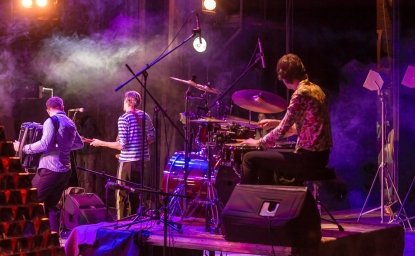
A blog of the Kennan Institute
During a session of the European Congress in March 2024, the leader of the People's Party and President of the European Commission, Ursula von der Leyen, stated that the greatest threat to the European Union comes from demagogues, populists, and nationalists, such as Germany's Alternative for Germany (AfD), France's National Rally, and Poland's Confederation. A year later, her warning proved prophetic in the German parliamentary elections, where the AfD came in second. A similar result may occur in the upcoming Polish presidential elections this May. Sławomir Mentzen, Confederation’s candidate, may reach the second round and compete with the frontrunner, Rafał Trzaskowski, the mayor of Warsaw and the candidate from the Civic Coalition, according to the latest polls.
With the presidential campaign in Poland in full swing, Ukraine and Ukrainians have emerged as central topics in the political debate. The debate environment in 2025, however, is very different from the solidarity that Poles felt towards Ukrainians in the weeks and months following Russia’s full-scale invasion in 2022.
There are about 1.5 million Ukrainian citizens living in Poland, of whom approximately 980,000 are likely refugees (Polish authorities do not keep an exact count; most estimates rely on statistics on payments to social security funds or documentation confirming temporary protection status). Although large-scale Ukrainian migration to Poland began after 2014, no Polish government has yet developed a comprehensive integration program for Ukrainians residing in Poland. After Russia's full-scale invasion of Ukraine in February 2022, the Polish legislature simplified many of the bureaucratic procedures for taking up residence in Poland for Ukrainian refugees. However, Poland still lacks a long-term strategic action plan for Ukrainian citizens. For instance, until September 2024, the government did not require Ukrainian children to attend Polish schools. Perhaps most importantly, the complex and painful shared history of both nations from the 20th century remains unresolved.
This is the context for the rise of anti-Ukrainian populist rhetoric by each of the three main presidential candidates: Rafał Trzaskowski, Karol Nawrocki (supported by the Law and Justice party, PiS), and Sławomir Mentzen. In their public statements, all three vaguely reference complaints from unhappy Polish citizens about Ukrainians, accusing them of cutting lines in hospitals, illegally receiving child benefits, and glorifying the WWII-era Ukrainian nationalist, Stepan Bandera. Each campaign clearly believes that the use of such stigmatizing language has strategic value in their respective election campaigns.
Both closed and public opinion polls show that many Polish citizens are weary of war. In 2024, 18 percent of Poles reported a negative attitude toward Ukrainians (up from 14 percent previously). 39 percent support closing the border to new Ukrainian refugees, and 74 percent believe that Ukrainian men should return to Ukraine. Moreover, 61 percent think that Ukrainians currently living in Poland should return after the war. Some 86 percent of Poles oppose sending Polish troops to Ukraine. At the same time, 65 percent support continuing aid to Ukraine even if the United States withdraws its support.
The polls also reflect underlying frustrations. For example, 62 percent believe Ukraine should express gratitude to Poland more explicitly. In addition, 49 percent cite the need for Ukraine to apologize for the Volhynia massacre and grant permission to exhume its victims from present-day Ukrainian territory to return to Poland. And 41 percent think Ukraine should provide future financial compensation to Poland. Any presidential candidate looking to retain or expand their electoral base must account for the worsening Polish public attitudes towards Ukraine, and especially towards Ukrainian citizens residing within Poland today.
Adding to the worsening mood towards the refugees in Poland, citizens of Ukraine and Belarus have been implicated in espionage and sabotage plots in Poland. According to 2024 statistics from the Polish police, Ukrainians committed the highest number of crimes among foreigners. Of the 9,753 offenses recorded among Ukrainians residing in Poland, 2,943 were cases of drunk driving – something often attributed to different cultural attitudes in Ukraine towards driving under the influence.
Consciously or not, some Ukrainians exacerbate Polish prejudices and provide ammunition for nationalist-leaning politicians, who eagerly exploit specific moments or examples during the election campaign.
For example, Ukrainian activist Natalia Panchenko (best known from the Euromaidan protest in Kyiv) criticized Mayor Trzaskowski's proposal to revoke child benefits for Ukrainians as discriminatory. Her later remarks about the potential rise in hostility between Ukrainians and Poles, including the risk of arson or confrontation, were taken out of context. Her words led to public outrage and calls to investigate her actions—and fed the growing Polish nationalist backlash against Ukrainian refugees.
In another instance, Sławomir Mentzen, accompanied by MEP Anna Bryłka, visited Lviv and filmed a video at the monument to Stepan Bandera, calling on Ukraine to abandon the cult surrounding the OUN leader. He equated the monument’s presence to the hypothetical construction of Hitler monuments in Germany. In response, Lviv Mayor Andriy Sadovyi labeled Mentzen a “pro-Russian politician with a Polish passport.” A Ukrainian public historian and military officer, Vakhtang Kipiani, reminded his social media followers of the assassination attempt on Polish Minister Bronisław Pieracki in 1934—an attempt organized by the WWII-era Ukrainian nationalist group OUN that the Nazis supported as an uprising against the Soviet government. OUN leader Stepan Bandera received a death sentence for this episode.
Meanwhile, in the Polish parliament, the opposition Law and Justice party has introduced a bill condemning Ukrainian nationalist groups such as the OUN-B and UPA,1 which were legally recognized in Ukraine in 2014 as fighters for Ukraine’s independence. It’s worth noting that this legislation is being pushed by a former education minister in Mateusz Morawiecki’s government—the same government that supplied weapons to Ukraine. Three parties—Law and Justice, the Confederation, and the Polish People's Party (part of the governing coalition, with the Defense Ministry under its control) —support the bill. The Polish People's Party does not have its own presidential candidate. In the last parliamentary elections, it ran in a coalition with the Poland 2050 party, led by current Speaker of the Parliament Szymon Hołownia, another presidential candidate, but with only an 8 percent approval rating.
Regardless of who wins Poland’s presidential election, the president will be bound by Poland’s constitution, which relegates its presidents to representing the country on the international stage. Actual policy will continue to be set by the Polish government, which has authority over negotiations with Ukraine regarding future EU membership and other matters. The 3 leading Polish politicians in the presidential race all feel compelled to adopt populist positions that reflect a growing nationalist backlash against Ukraine—a sentiment fed by the tragic war just across the border.
The opinions expressed in this article are those solely of the author and do not reflect the views of the Kennan Institute.
- The Organization of Ukrainian Nationalists-Bandera (OUN-B), a faction led by Bandera within the OUN, and the Ukrainian Insurgent Army (UPA) were Ukrainian nationalist organizations that played significant roles in World War II events involving Poland. The actions of the OUN-B and UPA during World War II and its aftermath remain contentious topics in Polish-Ukrainian historical debates, with varying interpretations of the events and their motivations.
Author


Kennan Institute
The Kennan Institute is the premier US center for advanced research on Eurasia and the oldest and largest regional program at the Woodrow Wilson International Center for Scholars. The Kennan Institute is committed to improving American understanding of Russia, Ukraine, Central Asia, the South Caucasus, and the surrounding region through research and exchange. Read more


Global Europe Program
The Global Europe Program is focused on Europe’s capabilities, and how it engages on critical global issues. We investigate European approaches to critical global issues. We examine Europe’s relations with Russia and Eurasia, China and the Indo-Pacific, the Middle East and Africa. Our initiatives include “Ukraine in Europe”—an examination of what it will take to make Ukraine’s European future a reality. But we also examine the role of NATO, the European Union and the OSCE, Europe’s energy security, transatlantic trade disputes, and challenges to democracy. The Global Europe Program’s staff, scholars-in-residence, and Global Fellows participate in seminars, policy study groups, and international conferences to provide analytical recommendations to policy makers and the media. Read more

Explore More in Focus Ukraine
Browse Focus Ukraine
Talking to the Dead to Heal the Living

Mustached Bards: Revisiting Soviet Ukrainian Pop Music


